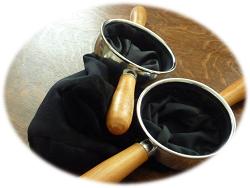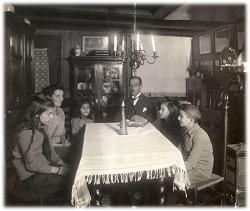The Deaconry and the Magistrates
The Deaconry and the Magistrates
From the old Church Orders we can learn that the Church alone never has been able to take complete care of the poor. And the Church has never made objection to it, when in addition to what the Church did, the magistrates and private institutions provided for those who were beyond the reach of the Church. In Article 26 of the old Church Order of Dort it was stipulated: "In places where there are Visitants to shut-ins or other Almoners, the Deacons shall request them to maintain proper correspondence with them to the end that the alms may be better distributed among those who have the greatest need."
In three different ways the care for the poor was arranged between the magistrates and the Church. First, the deacons worked entirely independent without any support from the magistrates. Second, the deacons did receive support from the magistrates, that is, subsidies and assets of the poor, but then the deacons were to maintain all the poor in such a community. Third, the officers of the public relief system cooperated with the deacons, supporting the poor out of one fund. In such cases the Board for the poor was composed of a certain number of deacons and an equal number of persons appointed by the civil magistrates.
The last method is the worst one: it puts the actions of the deaconry under legal control. In several instances it ended in the dismissal of the deacons. No further proof is needed that such is entirely contrary to the Word of God.
The character of the work of the deacons differs widely from that of the public relief system. It is the duty of the deacons to work independently. The poor, and the care of them, Christ has charged upon His Church.
However we should appreciate the relief extended to the poor out of public funds or by private institutions of charity. There may come days of special and of general depression, in which it becomes the duty of the magistrates to extend aid. Think of times of wide-spread unemployment, or of days in which special judgments are brought upon a land and nation. The circumstances may be such that the Church is unable to fill all the needs that arise. The work of the magistrates, however, should be of a supplementary nature. It is wrong when the magistrates take the lead in regard to relief for the poor. Magistrates may be required to acknowledge that the Church and private charity have the precedence in this sphere, and are in a better position to take care of the poor than the magistrates are, who should stay in the background, leaving the care of the poor to the deacons and to private charity, supplementing their work when necessary.
Alas! the Church recedes, no, is thrust more and more into the background, and the government, by means of its social legislation, regulates affairs in such a way that it becomes next to impossible for the Church to discharge her mission as a divine institution. In many communities it has come to such a pass that the deaconry is practically kicked into a corner. That's a strongly worded expression, nevertheless, it is true. And … there remains no longer an opportunity for God to perform miracles!
In all state interferences love is lacking; and the way of looking upward to God is shut.
In a part of my first congregation (Leiden) in the Netherlands, I frequently met an old fisherman who many years ago entered into glory. Time and again we have listened with delight when (in the private gatherings of God's people) he related the precious work of God's grace, wrought in his soul. How often he was privileged to testify with cheerfulness of the hope that was in him and of the strength and assurance his soul had been privileged to find in a Triune God. According to the world he was poor; but he was rich in God. I conducted the services when he was buried, and on that day, even when his mortal remains were committed to the grave, God bore his witness. From far and near many of God's children had gathered to pay him their last respects.
This was a man with a large family who had to endure much poverty. At one time the need became so great that there was not so much as a piece of bread in the house. The cupboards were empty. When mealtime arrived, he ordered his wife and children to sit at the empty table. It was to no avail whatsoever that the wife said: "My dear husband, you know that we have nothing to eat, and … must one still sit down?" "Sit we must," were the father's words, "now is the opportune time for us to call upon God."
Thereupon the man led in prayer and from a deep sense of need, called upon his God for the necessities of life. Heaven was opened to him and God inclined his ear. Oh, the faith he received to pour out his heart before God! Twice at the close of his prayer he spoke the word "Amen." These were indeed not mere words but they became reality. Oh, beloved, such is not a daily occurrence in the life of God's people! Such things as these take place in truth so seldom in our lives that they can be numbered. But, you will ask, what happened when the man concluded his prayer? Already a man was standing in the doorway with a basket full of all sorts of provisions. Deeply humbled, the man said to his wife and children: "Now such a Father in heaven as this your husband and father has. He has said: 'Before they call, I will answer; and while they are yet speaking, I will hear."' The basket full of bread and victuals was received with deep appreciation and great gladness. Every plate was filled with the precious food.

Add new comment